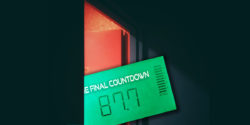Franken FMs are the radio service that refuses to die, even after the FCC ostensibly pulled the plug this past summer. Recall that these are former analog low-power TV stations on channel 6 whose audio could be heard at about 87.7 FM. Analog LPTV shut down on July 13, 2021, but then Venture Technologies Group was granted “Special Temporary Authority” to keep a couple of its stations broadcasting an analog FM audio signal alongside their digital video signals.
Now the number stations has grown to about a “half-dozen,” according to Radio World, in an piece that taps some of the architects of the new generation 3.0 digital television standard to get their take on this experiment. One says to make space for the analog FM signal, “is to actually lower spectral efficiency.” Another is skeptical, as well, saying, “[t]he system may work and be useful, but the information is not available yet to prove it.” A third was more optimistic, noting, “[w]ith the limitations of FM spectrum, they are making use of the FCC rules and channel segmentation philosophy. They’re putting it to good use.”
That said, the experiment still is temporary, and it would seem the initial six month lease is coming due soon. The stations may still petition for an extension, which the FCC would likely grant at least once. But an actual rulemaking will be required if Franken FMs are to become permanent fixtures on the dial.
Radio futurologist James Cridland observes that the BBC has announced plans to make some radio shows available as podcasts exclusive to the BBC Sounds app for 28 days, which also means they’ll be unavailable outside the UK during that period. It also means these programs will not be playable on other podcast apps, like Apple Podcasts, even for UK listeners. Cridland deems it, “another disappointing move from a broadcaster that should be widening its potential audience, not limiting it.”
He also notes additional broadcasters doing the same, while others, like Norway’s NRK, are pulling older archives off open, third-party apps. “In an age where radio consumption is in slow decline in many parts of the world, I’d suggest that anything that removes opportunities for listeners to discover new stuff is regrettable,” he concludes.
If CDs were recently declared dead, they’re sure enjoying the afterlife in 2022, as the format approaches the ripe age of 40. This past week erstwhile online music publication Pitchfork tossed its hat in the ring, but taking the additional step of talking to actual young people who’ve acquired the compact disc habit. A New York University sophomore and WNYU DJ says that she and her friends are, “on the CD wave.” Another college radio DJ at the University of Texas at Arlington reveals, “I have three big cases full of CDs that I play all the time,” while a student who writes for the Lawrence University newspaper reports, CDs are desirable because, “[w]hen all your life is virtual, even looking on Spotify can seem like draining work.”
As I’ve noted before, at least some of the Gen Z interest in CDs is driven by the current price advantage. The co-owner of California chain Amoeba Music says many classic albums can be had for just $4 to $5. I saw that for myself when I visited the Hollywood outlet back in 2019.
Meanwhile, across the pond, NME columnist Mark Beaumont admits,
“When the coroners come to collect my body, with ghoulish press photographers trailing behind to document the horror and depravity, local press will no doubt dub me The Disc Man. Entering my office space will feel like unearthing Spotify’s underground database – thousands upon thousands of CDs, stacked high to the ceiling and piled in mounds across doorways.”
Yet, despite his own passion, he had doubts about a full-fledged revival in 5-inch silver discs. Comparing the physical operation of playback to operating a household appliance, lacking in the romanticism of vinyl and turntables.
Back in April 2020 we talked with author, filmmaker and former DJ Bill Lichtenstein about groundbreaking Boston freeform radio station WBCN, the subject of his documentary “WBCN and the American Revolution.” Lichtenstein has authored a new companion book about the station, and recently guested on Monocle Radio’s “The Stack” to discuss it.



